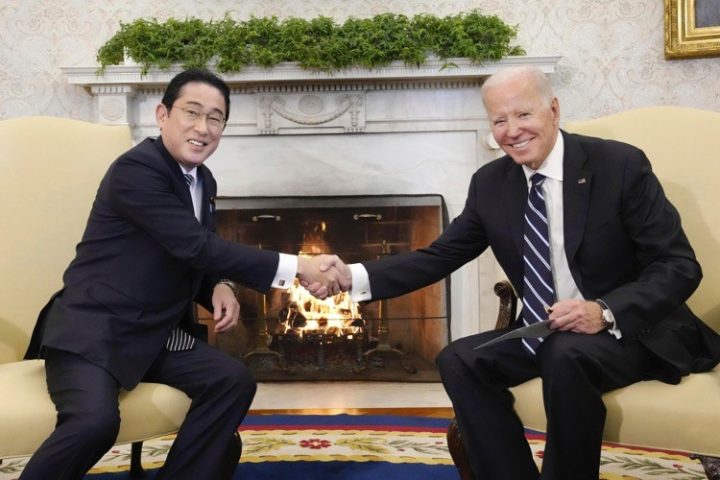
SINGAPORE — Japanese Prime Minister Fumio Kishida announced on January 14 that he told Western powers that East Asia could be the next Ukraine, as he called for a united front to deal with a hostile North Korea and an ambitious China.
Starting Japan’s year as head of the Group of Seven (G-7), Kishida visited leaders of all members of the group except Germany, where he hopes to go soon.
Ending his trip in Washington, where he met with U.S. President Joe Biden, Kishida stated he shared with G-7 leaders his “strong sense of crisis regarding the security environment in East Asia.”
The topic of China came up during the Kishida-Biden meeting, with both leaders reinforcing their views of the risk that an increasingly contentious Beijing posed to the global order and regional stability.
“We are modernizing our military alliance, building on Japan’s historic increase in defense spending and new National Security Strategy,” said Biden, as he hosted Kishida at the White House.
“The lesson of Ukraine has taught us that the security of Europe and the Indo-Pacific are inseparable,” Kishida told a news conference.
“The situation around Japan is becoming increasingly severe with attempts to unilaterally change the status quo by force in the East China Sea and South China Sea and the activation of North Korea’s nuclear and missile activities,” he said.
Kishida was alluding to China’s rising pugilism in regional waters, where the superpower has a series of territorial disagreements with with Japan, the Philippines, and Vietnam.
In August 2022, China launched missiles into waters that are located in Japan’s economic zone as part of major military drills around self-governed Taiwan, which Beijing considers a renegade province that must be reunited with the mainland, by force if necessary.
Kishida arrived in Washington after his government declared that Japan would double defense spending over the next five years, a major shift for a country that has been officially pacifist since its defeat in World War II. Yet the East Asian island nation has been dismissing past sensitivities amid rapid Chinese military expansion and provocative North Korean missile tests.
That being said, Kishida said that Japan still views itself as a “peace-loving” nation and will leverage on the G-7 to call for the gradual abolition of nuclear weapons.
Furthermore, Kishida promised on January 13 to overhaul his country’s military, cautioning that Russia’s actions in Ukraine had kickstarted a perilous new era that could spur China to invade Taiwan.
Kishida said that Japan and the United States were “facing the most challenging and complex security environment in recent history.”
He vowed that the two countries would contribute even more to the region and the world, emphasizing that they shared basic values such as “democracy” and the “rule of law.”
Greeting Kishida at the White House, Biden lauded the Japanese government’s announcement that it will double defense spending.
“Let me be crystal clear: the United States is fully, thoroughly, completely committed to the alliance and more importantly to Japan’s defense,” Biden said.
After his White House meeting, Kishida framed his defense strategy as a historic turning point in the U.S.-Japan alliance.
“Russia’s aggression against Ukraine has marked the complete end of the post-Cold War world,” Kishida declared at Johns Hopkins University’s School of Advanced International Studies.
“If we let this unilateral change in the status quo by force go unchallenged, it will happen elsewhere in the world, including Asia,” Kishida said, in likely an indirect reference to concerns about a Chinese invasion of Taiwan.
The relationship with China, Kishida added, “is the most critical challenge for both Japan and the United States.”
Additionally, Japan has joined Western powers in enforcing sanctions on Russia and has provided humanitarian, although not military, aid to Ukraine since February 2022.
Kishida called the policies a “major shift” in Japan’s policy toward Russia following long but failed talks to tackle a dispute over islands seized by Soviet troops after Tokyo’s surrender in 1945.
“Japan’s participation in the measures against Russia transformed the fight against Russia’s aggression against Ukraine from a transatlantic one to a global one,” Kishida said.
Also, Biden applauded Japan’s resoluteness on Ukraine.
“We’re stepping up to hold Putin accountable for his unprovoked war in Ukraine and I want to thank you, thank you for your strong leadership on this from the first conversation,” Biden said.
As part of its new defense policy, Japan is seeking to buy hundreds of Tomahawk cruise missiles, which presently are only in the arsenals of the United States and the U.K.
Japan will also for the first time build a “counter-strike” capability — being able to hit launch sites for missiles.
In discussions between the Japanese foreign and defense ministers and their counterparts, both the United States and Japan concurred that attacks in space could invoke their mutual defense treaty, even as China is stepping up its development of satellites.
“Our security alliance has never been stronger,” said a joint declaration by Biden and Kishida.
“The Indo-Pacific faces growing challenges, from actions inconsistent with the rules-based international order by China to provocations by North Korea…. In Europe, meanwhile, Russia continues to wage its unjust and brutal war of aggression against Ukraine,” said the statement.
It continued, “This landscape demands that the United States and Japan continue to strengthen our individual and collective capacity.”
Both leaders also reiterated a call to maintain “peace and stability” in the Taiwan Strait.
Besides, Japan is also hoping to participate in joint exercises with the United States and Australia and has facilitated diplomacy as part of the four-way “Quad” that also encompasses India. The leaders of the G7 — the U.K., Canada, France, Germany, Italy, Japan, and the United States — will convene in May this year in Hiroshima, the location of the world’s first nuclear attack and Kishida’s parliamentary constituency.



